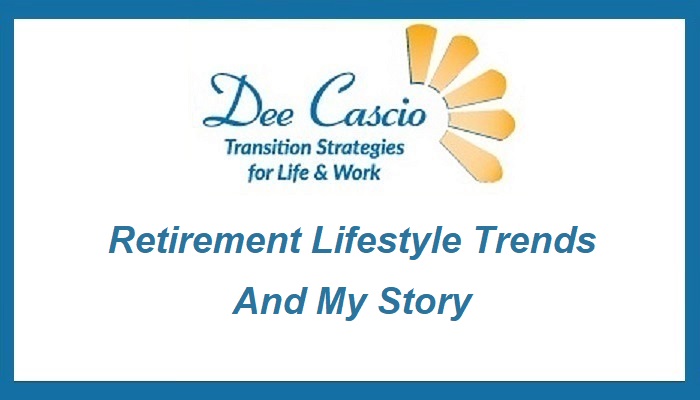What comes to mind when you think of retirement lifestyle trends? Leisure activities like travel and golf? Recareering? Volunteering for a cause close to your heart?
The National Center for Family and Marriage Research at Bowling Green State University found that over 25% of married couples over the age of 50 years old will ultimately get divorced and will find themselves living alone. You can read “How to protect a relationship during transitions” to avoid becoming a divorce statistic. In addition, as our individual life span increases, many of us will find ourselves living alone after our spouse or partner dies.
I know that these are not pleasant statistics, certainly not the warm fuzzy picture we have of retirement, but none of us can deny reality. Future generations that choose to marry later in life will contribute even more to the phenomena of people living alone.
As a member of the oldest group of boomers, I was the exception to the rule. While most of my friends married in their 20s, I chose to put my time, energy, and attention into my career. Consequently, I didn’t marry until I was 41 years old. During my adult years, I had several long-term relationships, but I didn’t get married because I hadn’t found the right person yet.
Living a single life during the early part of my adult life forced me to find ways of making my life full and interesting on my own without the companionship and input of a partner or spouse. I found early on that while men would come and go, my friends and family had a constant place in my life. I vowed that I would always maintain those relationships as well as my own interests whether I was married or not. That attitude has prevailed throughout my marriage and has contributed to a mutually healthy balance in our marriage.
Singles
People living alone have to be more resourceful, creative, and self-motivated to reach out and stay connected. More women who have entered the workforce during recent years feel confident, independent, and fully capable of supporting themselves.
Many more groups and activities are oriented towards singles than ever before. The Internet helps people connect whether they are looking for a partner or just want to join a group. Most of our boomer generation is not averse to seeking companionship or finding activities using this venue.
In talking to some of my single friends and colleagues, they say that being single after a divorce or the death of a spouse was most challenging in the first 2 to 3 years. After that period of time, they got into a flow and made the necessary adjustments in their lives. Weekends seem to be the hardest time for singles. I remember feeling that way.
Marrieds
I’ve noticed that there is a tendency for married people in my generation to rely more on each other than on friends or extended family. There is nothing wrong with this if it is balanced with enough support from outside the marriage for each partner. The problem occurs when there is a divorce or death of a spouse/partner. Too often, the remaining spouse can feel devastated because so much of their everyday activities involved their spouse. They find their adjustment difficult because their support system had not been maintained, nurtured, and expanded over time. Because none of us know what the future holds, having autonomy in any marriage or partnership while still feeling that close connection, is extremely important. Each partner or spouse needs to have the confidence that they will be able to survive if they suddenly find themselves single. This is an advantage that singles have over married couples because most have worked very hard to develop and maintain a strong support system.
Which Aspects Of These Retirement Lifestyle Trends Will You Choose?
Whether you are married or single, I believe that these two groups can learn from each other. People living alone, Eric Klinenberg says, don’t have to coordinate with anybody else and can do what they want to do when they want to do it. Singles don’t really expect or want to live with their children, nor are they sad and lonely. Most have a full and successful life because they have built a strong support system for themselves.
Married couples, on the other hand, have a built-in partner to do things with whenever they want to. Another benefit that comes from the interaction that couples have on a daily basis is that it forces couples to grow in ways they may not necessarily grow if they were single. In addition, retiring couples who are 55 to 64 years of age have a net worth four times greater than a single person who is retiring. Sharing funds clearly contributes to a more financially stable lifestyle.
Both lifestyles have their advantages and disadvantages. It is important to embrace where you are in life, married or single, and make the most of it.
Here are some suggestions to keep your retirement years rich and full no matter what lifestyle you’ve chosen:
• Create a vision and pursue your dreams for your retirement years.
• Nurture a quality support system of family, friends, and colleagues.
• Maintain a healthy level of autonomy in your relationships.
• Take good care of your health so you can be more independent as you age.
• Know yourself, your strengths, your values, and your purpose.
• Make sure a family member, friend, or professional knows where all your personal papers are in case there should be a serious accident or death, especially if you are single.
Whether you are single or coupled, stay connected to others to make the best of your life for the rest of your life.
